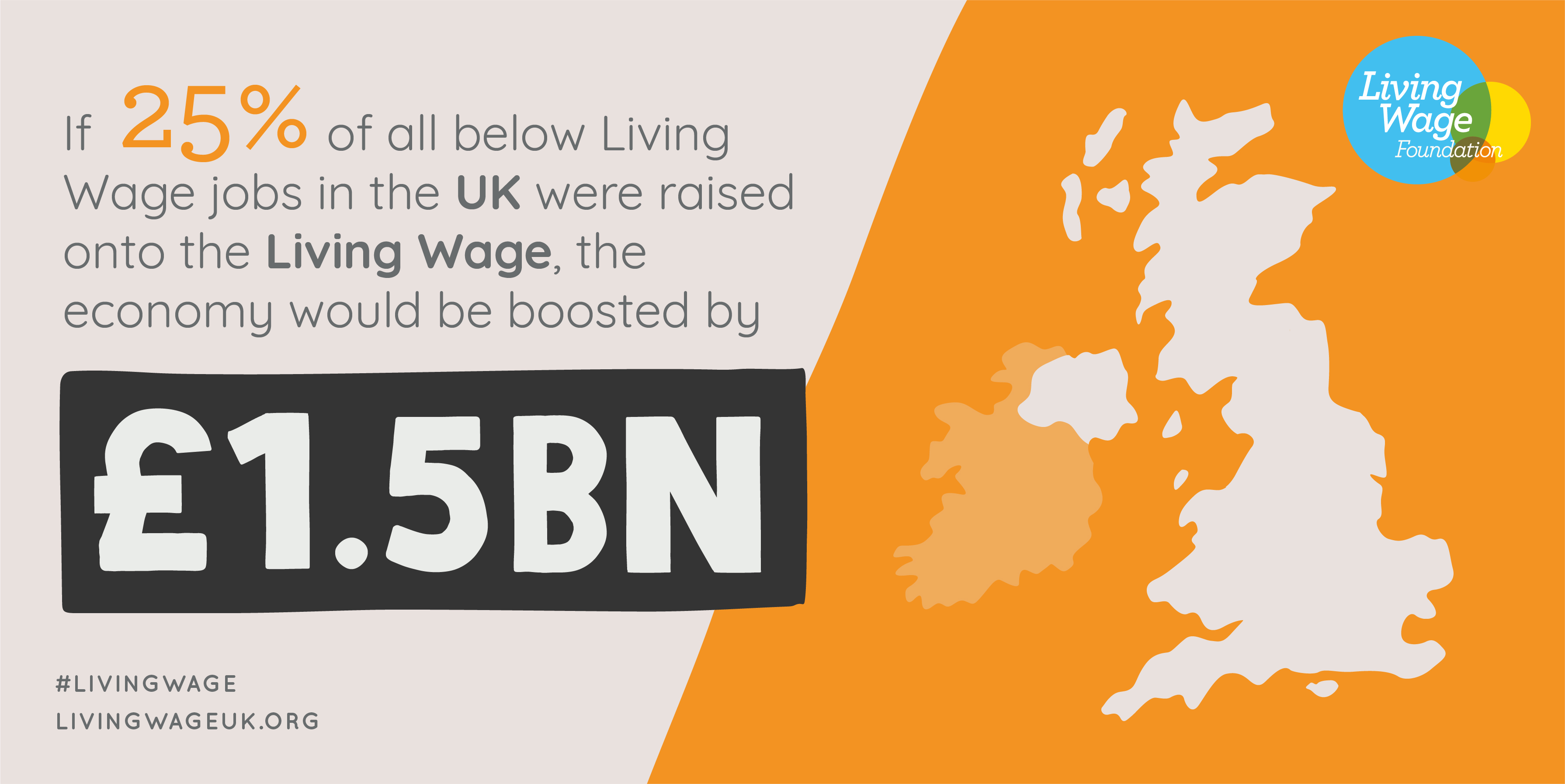Wider adoption of the real Living Wage could provide an economic boost to the UK economy worth over £1.5bn, according to new research by the Smith Institute.

If just a quarter of those on low incomes saw their pay raised to the real Living Wage based on everyday needs, a subsequent increase in wages, productivity and spending could deliver a £1.5bn economic boost to the UK economy, and support a more equitable recovery from Covid, according to a new report published by the Living Wage Foundation and the Smith Institute.
The report also found that an increase in Living Wage jobs could provide significant benefits to local economies, with 11 city regions, including London, Greater Manchester, Liverpool, Cardiff and Glasgow, benefitting from a combined economic boost of almost £700m.
The report found that if a quarter of low paid workers were lifted onto a Living Wage of £10.85 in London, and £9.50 in the rest of the UK, over 1.5 million people would benefit, with uplifted workers securing an average annual pay rise of £520 outside London and £950 within London.
Despite the impact of the Covid crisis, employers have continued to commit to pay the real Living Wage over the past 18 months, with over 2,900 more employers paying the real Living Wage since March 2020. A number of cities, towns and localities have also committed to become Living Wage Places, developing coalitions of private and public sector employers to drive an increase in Living Wage jobs. Areas with Living Wage Places action groups now include Dundee, Cardiff, Salford and Islington, amongst others.
However, despite the continued growth of the Living Wage movement, over 5 million people are still employed in jobs paying less than the real Living Wage.
Graham Griffiths, Director of the Living Wage Foundation, said:
"All of us have been affected during this crisis, but the real Living Wage offer a clear way to now recover and rebuild with stronger foundations. Workers and families need jobs that meet their everyday needs and allow them to thrive. Businesses need healthy and motivated workers unburdened by the stress of low pay. Cities and towns need local consumers with sufficient wages to stimulate economic growth. The Living Wage provides all of this and more and must now be a priority for all those looking to build dynamic and equitable local and national economies."
Paul Hunter, Deputy Director of the Smith Institute, said:
"The Living Wage not only transforms the lives of low paid workers and improves business performance, but also provides a growth dividend for local economies. As we exit the worst of the pandemic, increased Living Wage coverage can boost spending and support a wage-led recovery in our towns and cities."
Sadiq Khan, Mayor of London said:
"I am extremely proud that the number of Living Wage accredited employers in London has more than doubled since I took office, to nearly 2,300. And this research shows clearly that paying the London Living Wage isn't just the right thing to do, it makes good economic sense. Ensuring Londoners are paid a real living wage not only improves the lives of workers, it is fundamental to our recovery from the pandemic; and I call on all employers to commit to paying the London Living Wage."
Mayor of Greater Manchester, Andy Burnham, said:
"Our ambition is to make Greater Manchester the UK's first Living Wage City-Region. This report clearly sets out the wider benefits that would be felt in our local economy by achieving that aim. With hundreds of employers now signed up to Greater Manchester's Good Employment Charter, we're creating a movement where decent working conditions, secure work and paying a real Living Wage become the norm. Beyond the pandemic, we want to build an economy that works for everyone. Ensuring everyone in Greater Manchester is paid a real living wage for real living hours is the first step."
Calls to action:
The Living Wage Foundation has called on metro mayors and local authorities looking to recover from the Covid crisis to develop action groups to drive Living Wage take up in their towns, cities and regions, and to integrate the Living Wage into their economic development strategies. It recommends that they:
-
Set clear targets for Living Wage take up in their cities and regions, and develop a plan with other key local employers for how these will be met
-
Use their powers of planning and public procurement to encourage more local employers to commit to ensure their staff earn a real Living Wage
-
Make support for business development and investment in skills contingent on firms paying a wage their staff can live on.
-
Investigate the potential to create new real Living Wage buildings, zones and hubs in key public spaces.
| Living Wage Premium (annual benefit to individual) | Local Living Wage dividend (annual economic benefit to area) | Number of below Living Wage jobs | ||
|---|---|---|---|---|
| London | £950 | £327,903,000 | 865,100 | |
| Greater Manchester (Combined Authority) | £520 | £55,639,000 | 244,000 | |
| West Midlands (Combined Authority) | £520 | £520 | 230,700 | |
| Cambridgeshire and Peterborough | £520 | £30,853,000 | 135,300 | |
| West of England | £520 | £19,725,000 | 86,500 | |
| Liverpool City Region | £520 | £28,071,000 | 123,100 | |
| North East Combined Authority | £520 | £39,700,000 | 174,100 | |
| Sheffield City Region | £520 | £29,348,000 | 128,700 | |
| Cardiff Capital Region | £520 | £29,507,000 | 129,400 | |
| Glasgow City Region | £520 | £29,621,000 | 129,900 | |
| West Yorkshire Combined Authority | £520 | £520 | 239,600 | |
| TOTAL | £697,610,000 | 2,486,400 |
